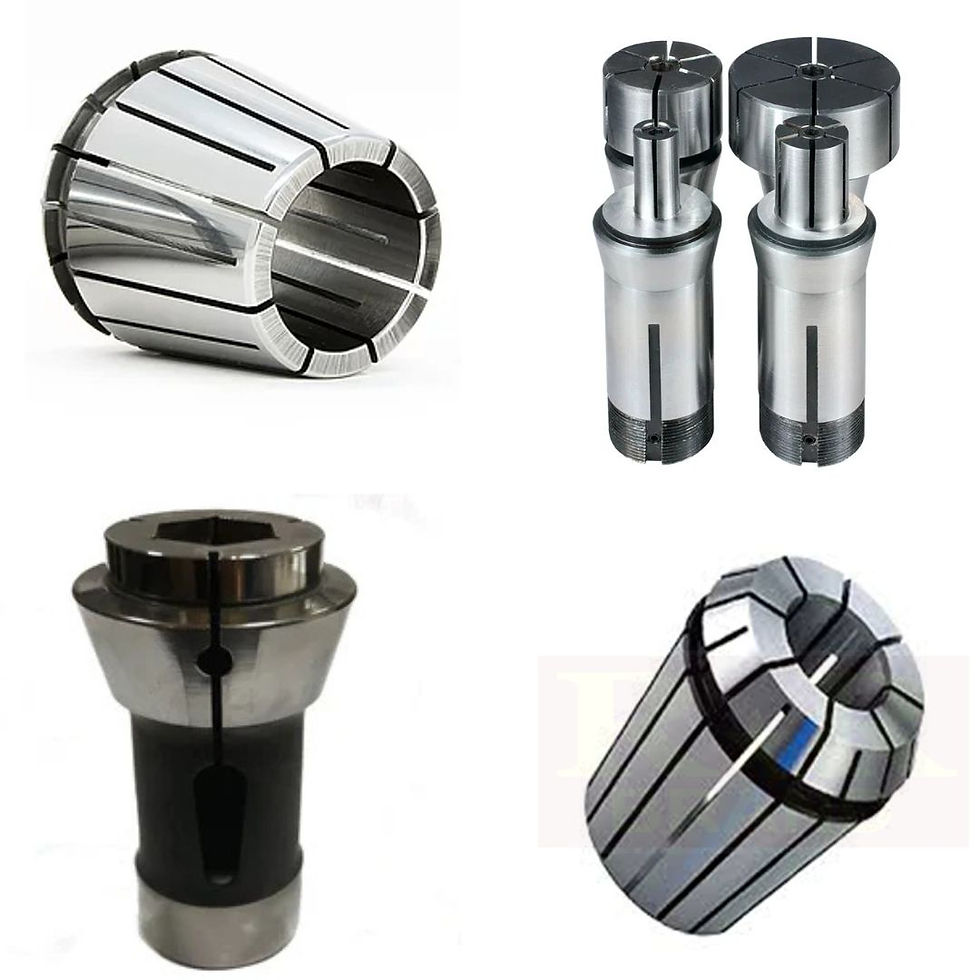The Future of Collets in Precision Engineering
- nazmakhatoon1057
- Sep 19, 2025
- 3 min read
Precision engineering has always relied on accuracy, stability, and efficiency to deliver high-quality products. Among the key components that ensure these standards are met, collets play a vital role. They secure tools and workpieces in machines, minimizing vibration and runout, which directly impacts machining performance.

As technology evolves, the future of collets in precision engineering looks promising, with innovations in materials, design, and manufacturing techniques driving enhanced performance across industries.
The Role of Collets in Modern Engineering
Collets are specialized chucks that hold cylindrical tools or workpieces by applying uniform clamping pressure. This design ensures optimal precision in operations like milling, drilling, and turning. Leading collet manufacturers provide a variety of collets, including Traub collets, DIN collets, and ER collets, each tailored for specific applications. The choice of collet can significantly affect machining efficiency, surface finish, and tool longevity.
Standard collets like ER collets are popular for their versatility and affordability, making them ideal for general-purpose machining. Traub collets, on the other hand, are widely used in automatic lathes due to their simplicity and reliability. For high-precision applications, DIN 6343 collets are preferred for their superior accuracy, durability, and strong clamping force. You can explore more about these on Sikka Collets – DIN 6343 Collets.
Advancements in Collet Technology
The future of collets in precision engineering is being shaped by several technological advancements:
Improved Materials: High-strength steels and specialized alloys are being used to manufacture collets, increasing their durability and reducing wear. This ensures longer life and consistent performance even under heavy-duty operations.
Enhanced Design: Modern collets are designed to reduce runout and improve concentricity, providing higher accuracy. Innovations in design also allow collets to grip a wider range of tool sizes without compromising stability.
Automation Integration: With the rise of CNC machines and automated manufacturing systems, collets are being developed for seamless integration, enabling quicker tool changes and reduced downtime.
Sustainability: Manufacturers are exploring eco-friendly production methods and materials to reduce waste and energy consumption, aligning with global sustainability goals.
These innovations ensure that collets remain an essential component in the toolkit of modern engineers.
The Growing Demand for Precision
Industries like aerospace, automotive, medical equipment, and electronics demand extremely tight tolerances and superior surface finishes. In such sectors, the performance of collets directly influences product quality and production efficiency. DIN collets and ER collets are increasingly favored for these applications due to their precision and reliability.
For manufacturers seeking consistent quality, partnering with experienced collet manufacturers is crucial. Sikka Collets, a leading collet manufacturer in India, offers a comprehensive range of Traub collets, DIN collets, and ER collets, engineered to meet global standards. Their products help businesses maintain high precision and reduce operational downtime. More details about their collets can be found on Sikka Collets and their Traub Collets range.
Future Trends in Collet Manufacturing
Several trends are expected to define the future landscape of collet manufacturing:
Smart Collets: Integration of sensors and IoT technology may allow real-time monitoring of clamping force, tool wear, and temperature, enhancing machine intelligence and predictive maintenance.
Customization: Manufacturers are increasingly offering collets tailored to specific applications, ensuring optimal performance for specialized tasks.
Global Standards: Adoption of international standards like DIN 6343 ensures uniformity in quality and compatibility across global machinery.
Advanced Coatings: Surface treatments and coatings improve wear resistance, corrosion protection, and performance under extreme conditions.
These trends indicate that collets will not only remain relevant but will also evolve to meet the growing demands of modern engineering.
Conclusion
The future of collets in precision engineering is bright, driven by technological innovation, material advancements, and industry demands for higher accuracy. From versatile ER collets to high-precision DIN 6343 collets and specialized Traub collets, the right choice of collet can significantly enhance machining efficiency and product quality.
As the industry evolves, collaborating with experienced collet manufacturers like Sikka Collets, a trusted collet manufacturer in India, ensures access to high-quality, durable, and precise collets designed for modern applications. For businesses looking to invest in precision tooling, Sikka Collets provides solutions that combine innovation, quality, and reliability. You can explore their full range of ER Collets and other collet types to stay ahead in precision engineering.

Comments